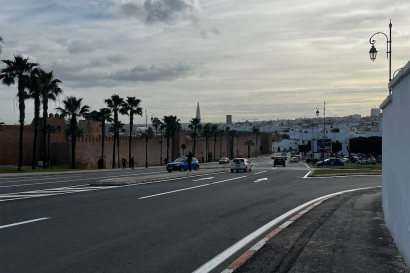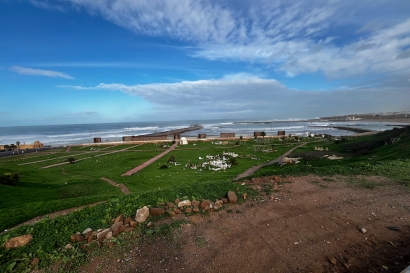I. There is a French saying, entre chien et loup, (between dog and wolf) that means twilight—the hour between day and night, that is, when the light is too blue and low to distinguish between friends and enemies. When dogs, clouded by shadows, might be wolves.
It's also the name of a restaurant in Mexico City that has live Latin jazz on Thursdays and that I frequented last summer. In September, thanks to that establishment, those were the only four words I knew in French. Now, one introductory French course later, the language is all I speak with my host mother here in Rabat. Needless to say, communication is imperfect; I speak, generally, in fragments, and she responds slowly, sometimes amusedly.
I've begun to think that this idiom, between dogs and wolves, encapsulates precisely what it feels like to live within such cavernous language gaps. It is always twilight. Everything you hear and everything you say is coated by shadowy doubt.
II. In Rabat's contemporary art museum, there is a display by an Algerian woman in which nails in a slab of wax form this Arabic phrase: اشك مزعج لكن اليقين سخيف
It means "doubt is uncomfortable but certainty is ridiculous"—a commentary on Algeria's social unrest, but also on the absurdity of language. How putting words to something is like trying to pin down wax.
I laughed when I saw that; what better way to describe the discomfort of my Arabic classes, where each morning at 8:30 a.m. I am reminded of how lost I still am in the language, even after three years of study. Mesmerized and lost.
Although I came to Morocco to learn standard Arabic, the language is really just a piece of the country's linguistic puzzle. On the streets you hear formal Arabic threaded through Darija, North Africa's brand of colloquial Arabic; and French; and sometimes Tamazight (the Berber language) or Spanish or English. For that reason, people insisted to me before I arrived here, Morocco is a terrible place to learn formal Arabic. No one speaks it.
There's some truth to that. But the bigger truth is: If you care about languages, Morocco is a dream.
III. In Darija, the word "مالحة" (salty) can be used to describe beauty, according to my professor. There's no translation. It means a kind of beauty that grows on you, that you don't notice at first. I love learning words with no English equivalent; it feels like when someone flips on a light in a room you didn't realize had grown dark.
IV. My favorite untranslatable word from Spanish is pasear, which means something like "to go around" or "to take a walk." Sightseeing with no particular place in mind.
Spanish becomes the main language spoken other than Arabic once you get far enough north in Morocco, but its influence is everywhere in the country. I didn't know that before I arrived here. I reached Tangier expecting to hit a brick wall of language, only to chat easily with my taxi driver en español on our way to the train station.
"What are you doing in Morocco?" he asked me. I explained I was a student, but then, after a moment, added "and to pasear." He nodded in understanding.
That's what's beautiful about Morocco's multilingualism: Sometimes, there are brief moments of clarity like that, in second or third languages, or hand gestures, or facial expressions. You learn how to find them.
Not always, of course. The other day, I ordered a glass of water in three languages and received two cups of orange juice. At the National Library in Rabat, once, I asked a guard where the bathroom was and—through a series of comical miscommunications in several languages—ended up with a personal invitation to a concert by the national orchestra, from the conductor himself (I did not find the restroom). Like I said. It feels perpetually like twilight.
V. As an exercise in our Arabic class last week, our professor had us translate English idioms to Arabic. It was to help with our grammar, he explained, but also a cultural exercise. Such phrases are condensed, crystallized cultural norms. They force you to think in new ways.
And despite the challenges of explaining what "by the skin of your teeth" means in Arabic, I think that's true. That's what Morocco's absurd mosaic of languages will do to you—whether you can speak them or not.

Katya Schwenk
I'm at junior at Georgetown, studying government, creative writing, and Arabic. I grew up in Vermont and Massachusetts. Interests include (but are not limited to!) radio, poetry, hiking, and beekeeping.








